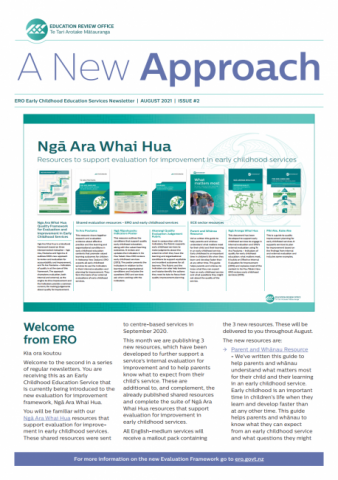
Welcome from ERO
Kia ora koutou
Welcome to the second in a series of regular newsletters. You are receiving this as an Early Childhood Education Service that is currently being introduced to the new evaluation for improvement framework, Ngā Ara Whai Hua.
You will be familiar with our Ngā Ara Whai Hua resources that support evaluation for improvement in early childhood services. These shared resources were sent to centre-based services in September 2020.
This month we are publishing 3 new resources, which have been developed to further support a service’s internal evaluation for improvement and to help parents know what to expect from their child’s service. These are additional to, and complement, the already published shared resources and complete the suite of Ngā Ara Whai Hua resources that support evaluation for improvement in early childhood services.
All English-medium services will receive a mailout pack containing the 3 new resources. These will be delivered to you throughout August.
The new resources are:
- We’ve written this guide to help parents and whānau understand what matters most for their child and their learning in an early childhood service.
Early childhood is an important time in children’s life when they learn and develop faster than at any other time. This guide helps parents and whānau to know what they can expect from an early childhood service and what questions they might ask about the quality of the service.
→ Ngā Aronga Whai Hua - This document has been developed to support early childhood services to engage in internal evaluation and ERO’s external evaluation using Te Ara Poutama – Indicators of quality for early childhood education: what matters most. It builds on Effective Internal Evaluation for Improvement (2016) and replaces most of the content in He Pou Tātaki: How ERO reviews early childhood services (2013).
→ Piki Ake, Kake Ake - This is a guide to quality improvement planning for early childhood services. It supports services to plan for improvement based on the findings from internal and external evaluation, and includes some examples.
The 3 new resources join these previously published resources:
→ Ngā Ara Whai Hua: Quality Framework for Evaluation and Improvement in Early Childhood Services, which outlines our approach to review and evaluation for accountability and improvement. This is the foundation document in our suite of seven publications.
→ Te Ara Poutama – Indicators of quality is at the core of the quality framework. ERO expects all early childhood services to use the Indicators in their internal evaluation and planning for improvement. They form the basis of our external evaluations of early childhood services.
→ Ngā Rāpupuku Indicators Poster outlines the conditions that support quality early childhood education, along with the valued learning outcomes. It presents the Indicators in relation to the learning and organisational conditions, and includes the questions ERO and services ask when working with the Indicators.
→ Akarangi Quality Evaluation Judgement Rubric is used in conjunction with the Indicators. It supports early childhood services to make judgments about the extent to which they have the learning and organisational conditions to support equitable and excellent outcomes for all learners.
We hope you find this suite of publications useful.
If you have not received a pack with the 3 new resources by the end of August, please let us know at info@ero.govt.nz
More information is available on our website: How ERO reviews early childhood services | Education Review Office.
Jane Lee
Deputy Chief Executive Review and Improvement
What’s coming up
We are in the process of transitioning home-based education and care reviews onto Ngā Ara Whai Hua
- We will continue with hospital-based education and care services reviews
- We will progress our approach to working with governing organisations
The new evaluation framework
ERO evaluates and reports publicly on the quality and effectiveness of education provided in early learning services. Our role encompasses accountability (including compliance with regulatory requirements), education improvement, and knowledge generation.
We know from research that the early years are a critical time for young children’s learning and development, particularly for the youngest children (birth to three years).
Research highlights the importance of stable relationships and interactions with sensitive and responsive adults, a focus on play and interactions that allow children to take the lead in their own learning, support communication and language, and their opportunities to move and be physically active.
ERO is updating its approach to review and evaluation, initially in centre-based early childhood services.
We regularly revise and update our approach to external evaluation in early childhood services to reflect current research and evaluation evidence about what matters most in the provision of high-quality early childhood education.
Changing societal contexts, including shifting patterns of parental employment, and increasingly diverse cultural and educational aspirations have led to changes in the early childhood education sector.
We have developed an updated Early Childhood Education methodology and are now implementing this across New Zealand.
We welcome constructive feedback, and have been proactively engaging with a wide range of sector groups across the country to share our approach and to hear their views.